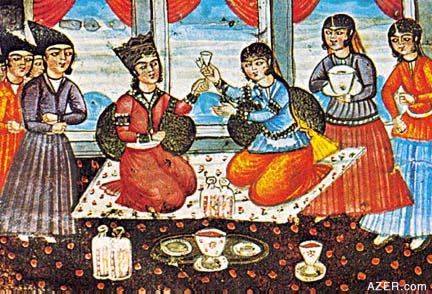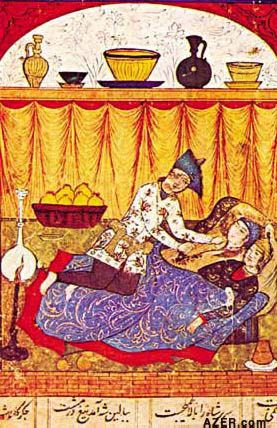|

Autumn 2000 (8.3)
Etiquette
Minding
Your "P'S and Q'S" in Medieval Azerbaijan
by
Farid Alakbarov

Above:
A miniature
depicting Nushafarin and Govhartaj. Unknown painter (1829). Courtesy:
Institute of Manuscripts
Don't
talk with your mouth full." "Don't stuff yourself."
"Don't put your elbows on the table." Most everyone
has heard these admonitions at one time or another during childhood.
But what about hundreds of years ago? Did these same rules apply?
In Azerbaijan, several medieval writers addressed the issue of
proper table manners, telling their readers exactly what they
should and should not do. Some of the rules were very practical,
along the lines of, "Don't bite off more than you can chew."
Hosts also received lessons on the proper way to entertain their
guests - basically, as lavishly as possible.
In all of these works, the overarching theme is the importance
of showing hospitality and respect to other people. Since eating
is a social activity, "table manners" are a reflection
of how one treats others. No matter what century you're in, table
manners serve as a gauge of one's social graces and upbringing.
_______
"Don't eat foods that you dislike or hate," writes
Sultan Giyasaddin, one of several medieval Azerbaijani thinkers
who gave advice on eating and etiquette. Perhaps we can still
learn from his 14th-century words of wisdom: "Be calm while
you eat; don't be in a hurry. After eating, don't do any hard
work or work that you hate."
Similarly, Muhammad Azam Khan (18th century) recommends dining
in a calm, comfortable environment: "For the dining room,
it is necessary to arrange a comfortable, clean place with some
decorations and fragrant odors. While eating, maintain an atmosphere
of calmness, rest and satisfaction. Don't digress from eating;
think only about the food you eat. Take food in small portions
or sips, so it can be slowly digested. Avoid negative emotions
like anger, irritation and dissatisfaction."
  Don't be a Gnawer Don't be a Gnawer
In "Kitab al-Buhala" (The Book About Misers), writer
Abu Osman al-Jahiz (775-868 AD) uses humor to target those with
impolite table manners. He lists various breaches of etiquette:
The Dragger drags out pieces of food from the pan and eats them
before they are completely cooked. The Dipper dips pieces of
bread in the pan to wipe up all of the juices, leaving his table
companions without any oil. The Swallower takes a handful of
pilaf, stuffs it down his throat and swallows without chewing.
Left:
A miniature
(1648) depicting a scene from Khosrov and Shirin, who are listening
to the maid's legends, a scene described in Nizami's "Khamsa."
Note the abundance and varieties of pomegranates and the delicately
shaped containers, which probably contained "sharbat"
(flavored fruit drinks). Woman standing at left is carrying a
traditional cone-shaped serving dish with pilaf. Art is now in
Bukhara, Uzbekistan. Courtesy: Institute of Manuscripts
The Sucker taps the meat bones against a plate to extract the
marrow and then sucks it down with a loud noise. The Shaker shakes
his hands after washing them, splashing water on his companions.
The Remover takes out the soft part of the bread loaf and eats
it, leaving the crust for his companions.
The Talker talks while he eats, even though there is still food
in his mouth. The Choker is in such a hurry that he puts large
pieces of food in his mouth and almost chokes on them. He often
has to wash his food down with water.
The Licker pokes his finger in the soup or sauce that has been
prepared for everyone, then licks it. The Gnawer gnaws on bones
at the table, just like an animal.
Dos and Don'ts
Here are some of the ideas proposed in the manuscript of Kutadgu
Bilik (Sacred Knowledge) by Yusif Balasagunlu of the 11th century:
When you choose a cook, make sure he is both honest and experienced
in preparing meals. If he's dishonest, your food will stick in
your throat and your stomach. When you hire someone to make beverages,
make sure he has a good knowledge of herbs and is able to treat
both constipation and diarrhea.
Know when to eat food hot and when to eat it cold. When you're
hot, eat cold; when you're cold, eat hot. When you're young,
your blood is hot anyway, so drink and eat a lot of cold stuff.
When you're over 40, eat and drink both cold and hot. When you're
over 60, you need both hot food and hot beverages to chase away
the cold.
  Be modest. Don't feel
obliged to accept every invitation. When you're a guest at someone's
house, control Be modest. Don't feel
obliged to accept every invitation. When you're a guest at someone's
house, control
your mouth and stomach: don't be a slave to them. Don't eat too
much as it will cause constipation and you will feel sick and
be in a bad mood.
Eat slowly, chew thoroughly. Eat with your right hand. Don't
be the first to reach for the food if there are older people
present. Don't touch food that is in front of others. Don't gather
all the food close to your own plate. Despite how hungry you
may be, eat in accordance with others. If they eat little, you
do the same.
Left: A miniature painted
by Mir Musavvir in 1527-28. Note the yellow pomegranates and
the various shapes of dishes. Courtesy: Institute of Manuscripts
Enjoy your food and make sure the hosts know that you appreciate
their time and effort. When you invite guests, make sure everybody
eats well. Make sure you serve a lot to drink as it facilitates
digestion. Serve fruit both dried and fresh at the end of your
meal. Don't forget to give your guests presents of expensive
fabric [probably silk]. Distribute them equally so no one gets
offended.
Be Subtle, Inconspicuous
In "Akhlag-i-Nasiri" (The Moral of Nasir), Azerbaijani
scientist Nasraddin Tusi (1201-1274) also has a few words to
say about proper table manners:
"First of all, wash your hands and teeth. Don't eat until
the host joins you. While eating, don't soil your face and clothes.
Carefully pick up the food with three fingers. Don't open your
mouth too wide. Don't lick your fingers. Don't study the dishes
too closely, and don't smell them when choosing what to eat.
Don't stare at the other guests while they are eating.
"If there are tasty or rare dishes, don't eat all of them;
kindly invite your table companions to share these dishes as
well. Don't reach to take dishes from the other corner of the
tablespread. Don't spit food out onto the plate or tablecloth.
If you find a bone or hair in your dish, remove it inconspicuously
so you don't ruin anyone else's appetite. Don't use a toothpick
when you are eating with other people.
"When you are full and satisfied, don't stand up right away;
wait for your friends to finish as well. After eating, wash your
hands, mouth, lips and teeth and carefully clean under your fingernails.
Then dry your face and hands with a towel."
Spoil Your Guests
Another bit of advice for hosts: it is impossible to feed your
guests too much. Take for instance the splendid feasts thrown
by Shah Khosrov, as described in Nizami Ganjavi's (1141-1203)
poem "Khosrov and Shirin". No doubt the poet got carried
away and exaggerated a bit.
From morning
to evening he held feasts,
Dishes were set forth in deep plates, wine - in bowls.
The feast-table stretched for miles,
He fed a fly with a buffalo's portion,
A mosquito - with an elephant's.
Due to the abundance
of dishes,
Guests didn't know what they ate.
Veal, lamb, birds and fish!
I don't know how much - as much as you wish!
Every morning,
Khosrov would eat kabab;
Powdered pearl was added to every piece.
The pearl was bought for 10 manns (30kg) of gold.
From a merchant
of Oman,
I have heard that such a pearl
Removes excessive moisture from an organism.
He ordered an
oven to be made of silver,
Taxes were collected from the entire province.
Inside this oven servants put 10-15 manns of
fragrant aloe
Instead of firewood.
A whole foal (deer) was roasted in the oven,
Prepared as Khosrov's food.
Roasted horsemeat
was placed on a golden tray
Weighing 1,700 miscals (8kg).
He nibbled several small pieces,
With a taste of pistachio or sugar jelly.
Then he looked over the guests gathered in the palace,
And presented the golden tray and silver oven
with all its dishes
To the first person he happened to glance upon."
Farid Alakbarov is a Medical Historian who specializes
in medieval manuscripts written in the Arabic script. Folklorist
Ahmad Oghuz and AI staff researcher Jala Garibova also contributed
to this article.
_____
From Azerbaijan
International
(8.3) Autumn 2000.
© Azerbaijan International 2000. All rights reserved.
|



